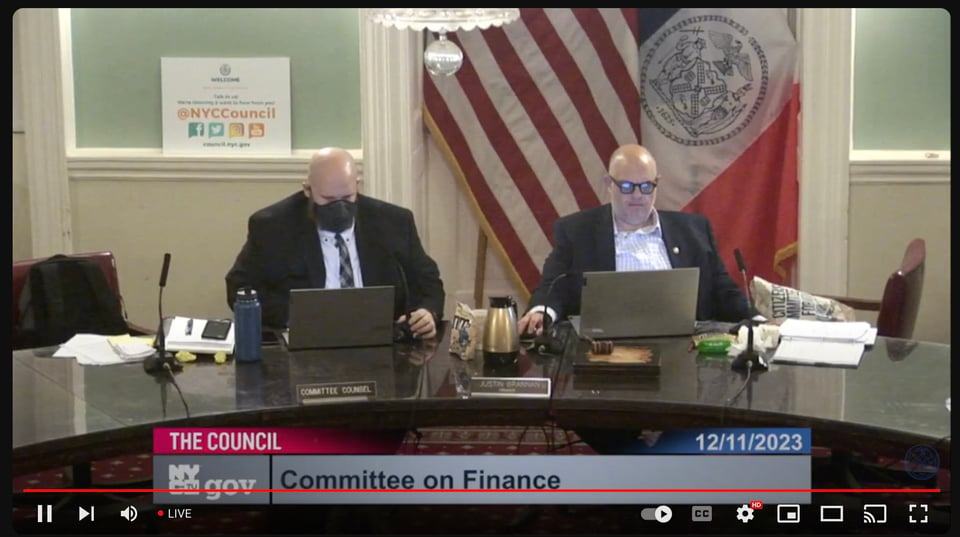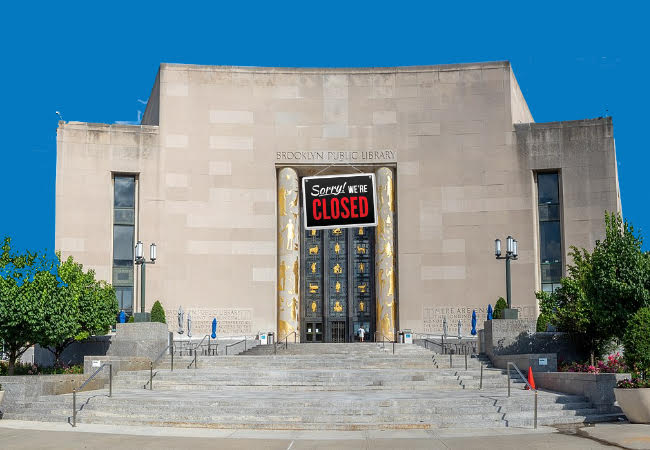The Council Fights Massive Budget Cuts
This is the second Keys to the City Council, a newsletter covering the NYC council's activity.
I'm seeking feedback! Please tell me what you liked, what you didn't, or if something piqued your curiosity and you want to learn more.
And if you know folks who'd want to read this, please forward it along.
Thank you!
Vikram
Last week the council held nine oversight meetings but the main event was a 10-hour hearing on the Mayor's citywide cuts to the budget.
The hearing went on well into the night.

I'm devoting today's newsletter to the budget hearing because the cuts are material and there's full-blown disagreement and pushback from the council around virtually every aspect of it.
Let's dive in.
How much is the mayor's office cutting?
Mayor Adams will seek up to 15% in budget cuts across every city agency: 5% now, then 5% cuts again in January and April.
The mayor's office is seeking to eliminate a budget gap of $7.1 billon.
The cuts are significant and will affect everyday operations and city services in NYC.
The mayor cites the migrant crisis as the reason for the cuts.
From the mayor's announcement about the cuts back in September:
New Yorkers are angry and frustrated, and they're right to be. I am, too. These tough decisions are a direct result of inaction in Washington and in Albany, but the die is not yet cast.
We can still avoid these cuts if Washington and Albany do their part by paying their fair share with a decompression strategy that reduces the pressure on New York City so we are not forced to manage almost entirely on our own.
NY State has provided $1.9 billion in funding for the crisis.
DC has provided $155 million in funding for the crisis.

Mayor Adams was to meet officials in DC regarding the lack of aid in November, but abruptly returned to NYC after the FBI raid connected to his campaign. He didn't meet anyone.
The city council agrees that federal and state funding must be aggressive. This is the only thing the council and the mayor's office are united on.
What's the pushback from the council?
It falls into roughly three buckets:
- The cuts are an overblown political maneuver: The cuts are deeper than they need to be because they're political gamesmanship aimed at Albany and DC.
- The approach to cuts is ham-fisted and harmful: Indiscriminate citywide cuts hurt everyday New Yorkers. We should surgically target cuts where they actually make sense instead.
- Funds devoted to the crisis are mismanaged: The mayor's been using his emergency spending power on the migrant crisis with little-to-no oversight.
Let's dig into these.
"The cuts are an overblown political maneuver."
The council disagrees that asylum seekers are solely responsible for the budget crisis. They see the city earning higher-than-expected revenues, and they don't believe City Hall is being creative enough in finding sources of revenue.
From Speaker Adrienne Adams' opening statement:
For months, the mayor's administration has solely attributed these budget challenges facing our city squarely on the arrival of tens of thousands of asylum seekers in our city.
... the reality is many factors are contributing to the gaps in our city's out year budgets, and asylum seekers are not to blame. The expiration of billions in federal COVID-19 stimulus dollars, slowing economic growth, real estate challenges such as commercial office vacancies, weakening residential home sales, and under budgeted costs are the underlying drivers of our budget gaps.
... For the current fiscal year, in addition to the $1.2 billion more revenue expected, there is also $1.45 billion of in-year reserves that must be used within the fiscal year.
... we cannot close our budget gaps by simply cutting services. There are voluminous tax breaks that the city and state continue to provide without an analysis of whether they provide public benefit to our economy. ... Let's think creatively about finding additional revenues in a thoughtful way that bears working and middle class New Yorkers from harm.

The council agrees that NYC is facing economic headwinds, but they don't agree with City Hall's forecast or any of the rationale behind how deep the cuts go.
Their conclusion is that the cuts are all political maneuver -- an entirely reasonable one considering the mayor's announcement about the cuts back in September had nothing else to say about them.
Councilmember Lincoln Restler had this to say to the Director of the Office of Management and Budget (OMB) in this clip, which is worth watching:
The mayor and OMB are pursuing a shock and awe campaign to try and pursue the most outrageous cuts that you can to try to shake the tree in Washington and Albany. We all know what you're doing.
We wish instead you would work with us responsibly to govern the city of New York instead of imposing these deeply harmful cuts that are undermining the health and the safety and the well-being of our communities. The cuts are not necessary.
"The approach to these cuts is ham-fisted and harmful."
From Speaker Adrienne Adams:
... the city is facing tough economic headwinds in the coming years that we must confront. But our approach must be surgical and strategic. ... Cutting every agency's budget indiscriminately will disproportionately impact everyday New Yorkers.
The city council disagrees with City Hall's blunt implementation of its budget cuts, requiring up to 15% in cuts to every city agency.
As a city, we have already witnessed what happens when city agencies are understaffed and lack the resources needed to serve New Yorkers.
The delivery of life saving food, benefits, and housing assistance to help residents find and stay in their homes have already been delayed, putting too many families at risk. Working and middle class families have been leaving New York, often because of the combined lack of affordability and breakdown in city services.
A small cross-section of the cuts:
- Thousands of slots will be eliminated from early childhood programs (e.g. pre-K).
- The DoE will slash initiatives for free summer school, the teaching of computer science, and funding for community schools.
- Public libraries have slashed funding are now closed on Sundays.

Some cuts are for popular programs that do not make a dent in the $7 billion City Hall is looking for. For example, community composting programs -- costing $3 million or 0.04% of the budget gap -- are being canceled.
The council wants City Hall to pursue cuts judiciously, targeting deeper cuts where they make sense and imposing shallower cuts on critical services.
From Speaker Adrienne Adams:
Some agencies' needs are greater than others because of the direct human services they provide to the public while others are able to maintain their level of service because they always have budgets greater than their need.
So why use a cudgel to make these reductions, mandating a 15% reduction for each agency instead of taking a scalpel approach to the reductions looking at the budget holistically?
Here's the thing: it turns out these cuts are not actually going to be 15% city-wide, anyway.
NYPD, NYFD, and sanitation will all be part of the first 5% cut, but they won't be part of the additional 5% cuts the mayor will impose early next year.
So City Hall has decided to pursue deeper cuts across every agency that is not NYPD, NYFD, or sanitation, a fact that got far less attention at the hearing than I expected it to.
From Office of Management Budget (OMB) Director Jacques Jiha:
"As we announced in September and then again in November, we will implement another 5% PEG on city funded agency spending in the upcoming preliminary budget. The mayor, however, is concerned about the impact on safety and cleanliness. Hence, the fire department, the sanitation department and the NYPD will be exempted from this round of savings."
"Funds devoted to the crisis are mismanaged."
From Speaker Adrienne Adams:
The city has numerous nonprofit community-based organizations that provide many of the same services that the city is contracting with for-profit entities, even though some of those for-profit providers have little to no track record of providing the services for which they were contracted.
In August 2022, the mayor invoked emergency spending powers so the city could procure contracts to house migrants more quickly.
Early this month, Brad Lander, the city comptroller, revoked the mayor's emergency spending powers, requiring a review of every contract dedicated to serving asylum seekers.
Among the reasons for the revocation is a review of a contract with DocGo -- a mobile healthcare company -- to provide shelter services for migrants:
The [Department of Housing Preservation and Development]... fails to describe how the $432 million price tag was reached.
There was little evidence to show that this company has the experience to provide the services it has been contracted for. Contradictory information was provided regarding their fiscal capacity and serious questions were raised about the integrity and responsibility of this vendor and their subcontractors.
There is evidence that DocGo served meals that made migrants sick and that the company throws out thousands uneaten meals daily

This lack of oversight is pervasive.
Last week the council also held a hearing overseeing small business contracts for shelter services and found more of the same.
Councilmember Julie Won talks about people getting sick from food in these shelters:
We have gotten calls from hospitals, nurses, doctors, school nurses, teachers, and principals, as well as parents about the food quality, especially in children who are malnourished, having rapid weight loss, and are getting sick from the food.
Councilmember Gale Brewer talks about food being thrown out:
... neighbors complained because so much food has been thrown out on a regular basis. Brand new food, etc, spilled into the neighborhood. ... Department of sanitation complained to me.
Councilmember Julie Menin blasts agencies for accepting price points for meals ranging from $3 to $15 from the same catering business across multiple agencies:
It's kind of incredible testimony today to hear that there are these very disparate price points across various agencies.
Right now, the administration is asking us to accept cuts to education, sanitation, and critical services, And yet the administration has a system where you have various agencies using different price points.
Why isn't the city of New York harnessing its purchasing power on these contracts to drive the price down?
What's next?
If City Hall listens, we should see some combination of:
- Smaller cuts.
- More targeted cuts.
- More oversight over city funds dedicated to helping asylum seekers.
My understanding based on this document is that there is room for negotiation and the council is responsible for accepting or rejecting changes to the budget (which I believe these successive 5% cuts all constitute).
But I'm not sure -- if you know more about what the process is from here on out, please email me.
Comments? Suggestions? Want to hear more about something? I use AI to sift through bills and hearings and I'm happy to poke around.
I'm also working on turning multi-hour hearings into neatly segmented transcripts with pull quotes and usable summaries. Holler if you want to speak about this (or related) work.
You can send an email to voberoi@gmail.com or reply to this email.